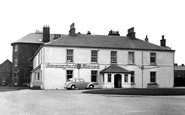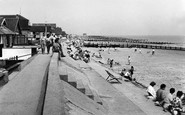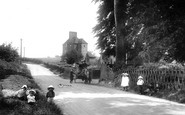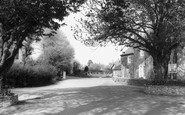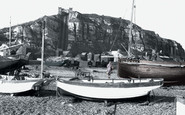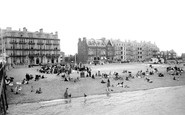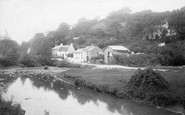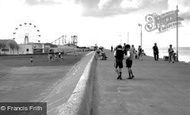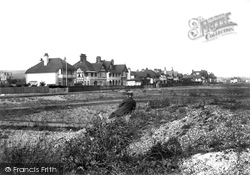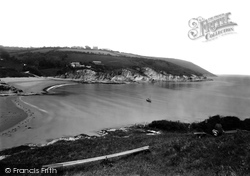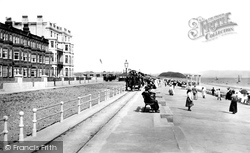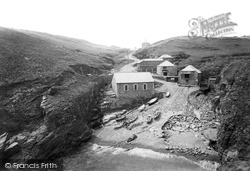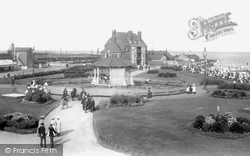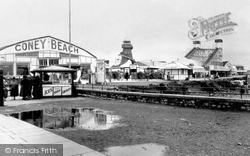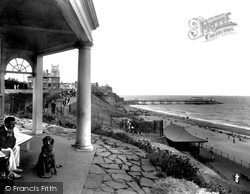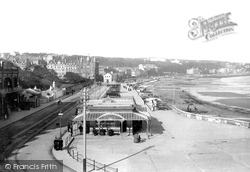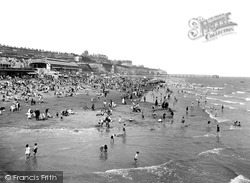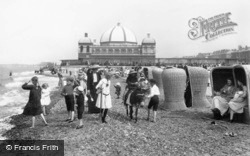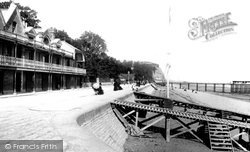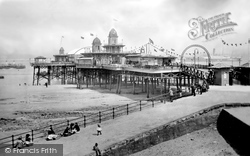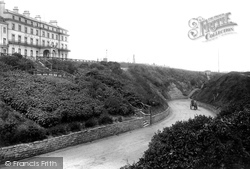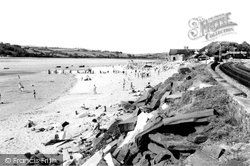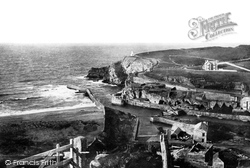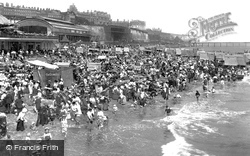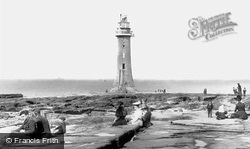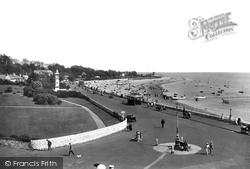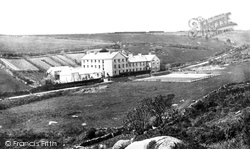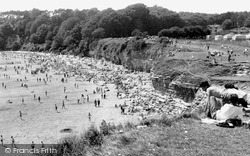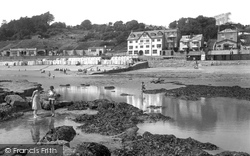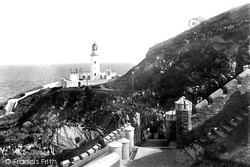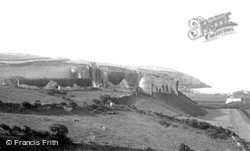Places
1 places found.
Those places high-lighted have photos. All locations may have maps, books and memories.
Photos
11 photos found. Showing results 781 to 11.
Maps
4 maps found.
Books
1 books found. Showing results 937 to 1.
Memories
1,362 memories found. Showing results 391 to 400.
Seascale And The Scafell Hotel
I was 9 and My mother Vi worked part time at the Hotel doing afternoon teas. Phil and Betty Roddis managed the Hotel. They had just had a young daughter, Phillipa. I spent many a day within the hotel. I remember the ...Read more
A memory of Seascale in 1957 by
Tanker In The Mud
Around that time we had 3 or 4 holidays at Jaywick Sands and St.Osyth's. Although I think we nearly didn't go back after this adventure! 'The Sands' at Jaywick opened at low tide to miles of shifting mud! Well very waterlogged ...Read more
A memory of Jaywick in 1957 by
Childhood Memories
My family moved to Great Bookham in 1957, and were the first owners of 1 Allen Road, part of a small Close of bungalows built by New Ideal Homes of Epsom. The 1904 photograph shows the beautiful beech trees by the Leatherhead ...Read more
A memory of Great Bookham in 1957 by
Funland Penny Arcade
My late mum was part owner of the Funland Arcade and I worked there evenings, doing repairs to the 'Allwins' penny amusements and counting pennies etc. I worked on her deckchair stand on the beach and also sold ice cream on the ...Read more
A memory of Pagham in 1957 by
Bottle Alley
I can also remember Bottle Alley which was the St Leonards side of the pier during the 1950's. My Mum sometimes used to take me to the Sun Lounge near Bottle Alley when I was a very small child where she would have a coffee and I would ...Read more
A memory of Hastings in 1957
90 Albion Street
How exciting to see this photo. In the early 1950s my nan had a sweet shop at 90 Albion Street (I think the building on left with drug sign). At around 1956 -57 my mum, dad, sister Trude and myself moved in. We built up the garden ...Read more
A memory of Southwick in 1957 by
Only The British
This is about the place on the pebbled Southsea Beach where our family always established their bit of 'turf'. There was a whole ritual to it ...setting up the blanket so it wouldn't get blown out to sea..the baskets of delicious ham ...Read more
A memory of Southsea in 1957 by
On Our Way To Three Cliffs Bay
For my sister, Carol, and I, Parkmill meant only one thing - Shepherd's Shop. The only place to buy ice cream and sweets and even the new 'Coca Cola'. We always stopped here on our way to and my aunt's wooden bungalow ...Read more
A memory of Parkmill in 1957 by
I Was There!
I was/am the lad on the right! I discovered this picture a few years back in a superb Frith's book on Kent. Alongside me is my mate Ray. I think the year is more like 1957 or it could the summer of 1956. It was during those lovely days ...Read more
A memory of Sheerness in 1957 by
Mersea Island Primary School 1950s
Born on Mersea island- what a haven we school children had to live and grow in. Endless poppy fields and bluebell woods, golden beaches and primrose banks flanked the leafy lanes. Greedy land grabbers have ...Read more
A memory of West Mersea in 1956 by
Captions
1,130 captions found. Showing results 937 to 960.
Kingsdown stands on the coast where the white cliffs of Dover give way to the extensive shingle beach that runs eastwards to Walmer & Deal. Caesar is said to have landed in this vicinity in 55BC.
This bay is typical of a number along the coast of Ceredigion. Deeply inset, it provided shelter for loading and discharging cargoes, including herring, and for the 11 ships that were built here.
Horses tread the tramway along Pwllheli's busy promenade at Marian-y-mor (then known as West End). The tramway had opened two years earlier, in 1896, and was closed in 1927.
The elegant brick railway station is at the far end, and the Grand Hotel is on the left. On the right is the Taliesin Hotel.
Church Cove is on the east side of the Lizard. The building on the left is the lifeboat station, erected in 1885; it is unusual that it is set at right angles to the beach.
The awnings are still up on the bandstand and the musicians are tuning up in readiness for the afternoon matinee. A colourful throng is being entertained by pierrots on the beach.
This view shows the fairground on Coney Beach.
This man and his best friend are sheltering from the sun on the north-facing side of this Victorian enclosure.
The tide is well and truly out in this picture, taken as the shadows lengthen on a summer evening in 1896.
In 1926, the Sands railway station closed and was converted to amusement arcades housing hundreds of slot machines; there was also a helter-skelter and a skating rink.
This bustling scene looks east to the pier pavilion and the pier. The bucket and spades, bare feet, donkeys and wickerwork basket chairs recapture a vanished era.
Here the beautifully constructed Esplanade is viewed in close-up. Its creation was vital to form a refined loop around which the wealthy and fashionable could travel.
They would arrive on an early ferry with their wicker baskets and 'set up shop' along the promenade or on the beach.
This road up from the beach was first started at the time that George Hudson bought the West Cliff Estate in the 1850s, and it got the name from the strategic pass important in the Afghan wars, which
Here we can see a closer view of the railway line, which runs parallel to the river virtually all the way to Carmarthen.
Portreath was a busy mining port in the 19th century, when sailing vessels loaded copper ore for the Welsh smelters and returned with coal for the mine engines.
The sandy beach is overwhelmed by a tide of holidaymakers, most of whom have probably arrived here by train at the station in the left background.
This is the chief Mersey bathing-place, which at once gains and loses by its proximity to the great commercial city of Liverpool.
Motor vehicles have mostly replaced horse-drawn carriages by the first decade after the Great War.
The Eastern Telegraph Co's large cable station was established in the valley just inland from the beach at Porthcurno, where undersea cables came ashore.
Long before the advent of mass tourism, the coastline here had been exploited as a source of income for local people.
An incredibly low ebb- tide, which would also have coincided with one of the highest tides of the century, has exposed the rock pools on Lucy's Ledge.
Douglas Head Lighthouse was erected in 1892, replacing the sixty year old Red Pier light. In 1786 Douglas harbour lighthouse had been destroyed during a storm and not rebuilt.
The castle was erected on a red sandstone spur from locally quarried limestone.
Places (1)
Photos (11)
Memories (1362)
Books (1)
Maps (4)



